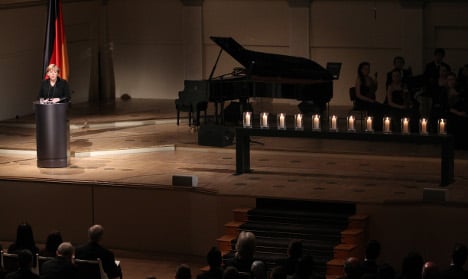The memorial took place some three months after the country was shocked by revelations that a far-right group calling itself the National Socialist Underground (NSU) had gone on a racist killing spree from 2000 to 2006. The trio murdered nine immigrant small business owners – eight Turks and one Greek – as well as one policewoman.
Chancellor Angela Merkel gave the main address – following the sudden resignation of President Christian Wulff last week – before 1,200 guests at the Concert House on the central Gendarmenmarkt square.
“The murders of the Thuringian terror cell were an attack on our country,” a sombre-looking Merkel said. “They have brought shame upon our country.”
She was flanked on stage by candles representing the victims: “Ten burning candles, ten lives extinguished – extinguished by cold-blooded murder.”
Semiya Simsek, the daughter of the first victim, expressed the fears and frustrations of the survivors after the crimes of the far-right terror cell were revealed: “My father was murdered by neo-Nazis. Is that supposed to comfort me?”
The 25-year-old was born and raised in Germany, but she had previously admitted she had considered leaving the country because she could not cope with knowing her father was killed simply because he was not German.
“Am I at home in Germany? Of course I am,” she said at the ceremony. “But how can I be sure of this when there are people who don’t want me here. In our country, in my country, everyone should be able to realize their dreams.”
The NSU murders put Germany’s police and domestic intelligence services in a particularly bad light. The authorities failed to consider xenophobic motives for the killings for several years, instead chalking them up to organized crime in ethnic communities.
The cases were even derogatorily dubbed the “Döner Murders“ because so many of the victims were Turkish and a few worked at kebab shops.
Merkel asked the family members of the victims for forgiveness.
“I know how difficult it must be for you to be here today,” she said.
Kenan Kolat, the head of the Turkish Community in Germany, said he welcomed the state ceremony but lamented that the country’s political leaders had apparently learned little from a spate of xenophobic murders in the early 1990s.
“It’s important to condemn racism but that’s not enough,” Kolat told the Neues Deutschland newspaper.
The Local/mry




 Please whitelist us to continue reading.
Please whitelist us to continue reading.
Member comments